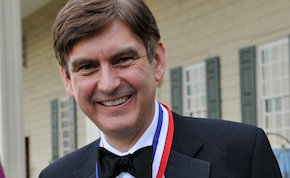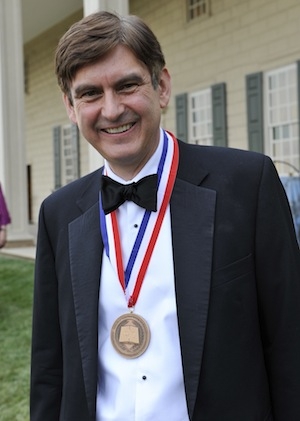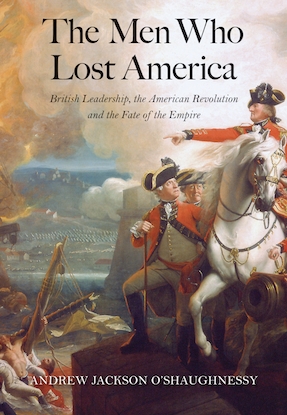History glories in tales of victorious warriors and farsighted statesmen, yet quickly shunts aside the losers. While many writers on the American Revolution celebrate the heroism of colonists overthrowing a despotic, overseas government, Andrew Jackson O’Shaughnessy, winner of the 2014 George Washington Book Prize, takes a different tack. In The Men Who Lost America: British Leadership, the American Revolution, and the Fate of the Empire he tells us the story from the losers’ point of view — and shows that perhaps they weren’t such losers after all.”
O’Shaughnessy will share his insights at this year’s George Washington Book Prize Celebration at Washington College on Thursday, November 6, at 5:00 p.m. in Decker Theatre, Gibson Center for the Arts. Preceding his talk, a British High Tea reception and book signing will begin at 4:00 p.m. in the Gibson Center’s Underwood Lobby. Hosted by the C.V. Starr Center for the Study of the American Experience, both events are free and open to the public.
A full day of activities is planned for O’Shaughnessy’s visit to Chestertown, beginning with an informal coffee and conversation with the author from 10-11 a.m. at the Kent County Public Library. Back on the College campus, a special British-themed lunch menu will be served in the dining hall, and the Maryland Loyalist Brigade will drill in Martha Washington Square starting at 3 p.m. and culminating at 3:55 p.m. with a musket salute to the award-winning author.
The full schedule is as follows:
Thursday, November 6
10:00 a.m. – Coffee and Conversation with the author, Kent County Public Library, The Chestertown Library Inc. Building, 207 Calvert Street, Chestertown
3:00 p.m. – Maryland Loyalists Militia, Martha Washington Square, Washington College
4:00 p.m. – Book Signing and British High Tea, Underwood Lobby, Gibson Center for the Arts
5:00 p.m. – “Making History,” a Conversation with Andrew Jackson O’Shaughnessy and Adam Goodheart, Decker Theatre, Gibson Center for the Arts
The Washington Prize jury praised The Men Who Lost America as “ground-breaking” and “a major contribution to the history of the American Revolution.”
Countless popular books and Hollywood films have portrayed the Redcoats and their leaders as blundering nincompoops at best, sneering sadists at worst,” said Adam Goodheart, director of Washington College’s C.V. Starr Center for the Study of the American Experience, which administers the Washington Prize. “O’Shaughnessy’s work ought to kill these stereotypes once and for all — and, in the process, give Americans a richer and more nuanced understanding of our nation’s origins.”
A dual citizen of Britain and the United States, O’Shaughnessy is the Saunders Director of the Robert H. Smith International Center for Jefferson Studies at Monticello and a professor of history at the University of Virginia. Garnering popular and critical acclaim on both sides of the Atlantic, The Men Who Lost America was nominated for BBC’s History Magazine Book-of-the-Month and received the New-York Historical Society’s prize for American History, the Cincinnati History Prize, and the Fraunces Tavern Museum Book Award. A scholar who specializes in the 18th century Atlantic world and the British Empire, O’Shaughnessy previously authored An Empire Divided: The American Revolution and the British Caribbean.
The $50,000 Washington Prize was awarded to O’Shaughnessy at a black-tie dinner at George Washington’s Mount Vernon Estate in May. Sponsored by Washington College, the Gilder Lehrman Institute of American History, and George Washington’s Mount Vernon, the Washington Book Prize is one of the largest literary prizes in the nation. Awarded annually for the year’s best book about America’s founding era, it particularly recognizes well-written books that contribute to a broad public understanding of the American past.
Learn more about the George Washington Book Prize at washcoll.edu/gwbookprize.





Write a Letter to the Editor on this Article
We encourage readers to offer their point of view on this article by submitting the following form. Editing is sometimes necessary and is done at the discretion of the editorial staff.